For past Meeting Room events and Meetings
ICEthics Meeting Room: September 2025
“A Difficult Heritage – Ethical issues on Colonialism, Racism and the Marginalized in Museums”

🗣️ A case study by Željka Jelavić, Ph.D. & Marija Živković📅 22 September 2025
📌 Watch here: https://www.youtube.com/watch?v=4SiYKwIDswc
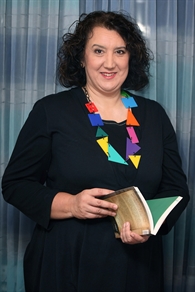
The Ethnographic Museum Zagreb presents Travelers, an exhibition exploring the journeys of people and objects in the Collection of Non-European Cultures-from colonial times to today. It addresses colonialism, the roots of ethnology, and the role of museums in shaping views of the “exotic Other.”
ICEthics Meeting Room: June, 2025
“Making up the original: Use and misuse of AI in museums.”
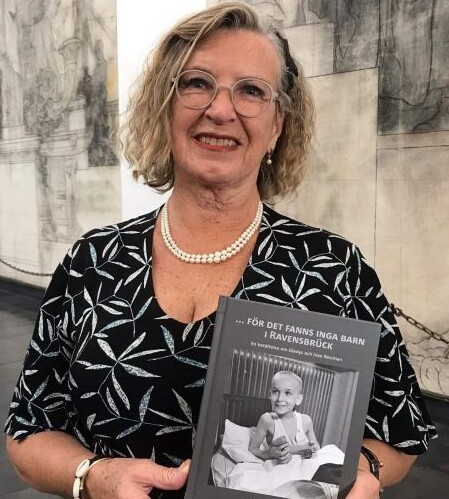
🗣️ A case study by Lena Millinger
📅 23 June 2025
📌Watch here: https://www.youtube.com/watch?v=LpTui0Jhw2s
A museum uses AI to improve blow-ups of Holocaust survivors. The external supplier adds lipstick, eyeliner, plucked eye brows etc. on the original photos, which are put up without museum staff reacting. Only when a visitor notices these strange faces in the exhibition months after the exhibition opening, and reacts to these atrocities, by sounding the alarm to media, does the museum decide to change the pictures! How to maintain dignity and authenticity in museum work if AI is left to rule?
IC Ethics Meeting Room: “I won’t be able to cope much longer” – Personal strain when working with emotionally charged topics in a professional museum setting – Dr. Kathrin Pabst, January 8th 2025
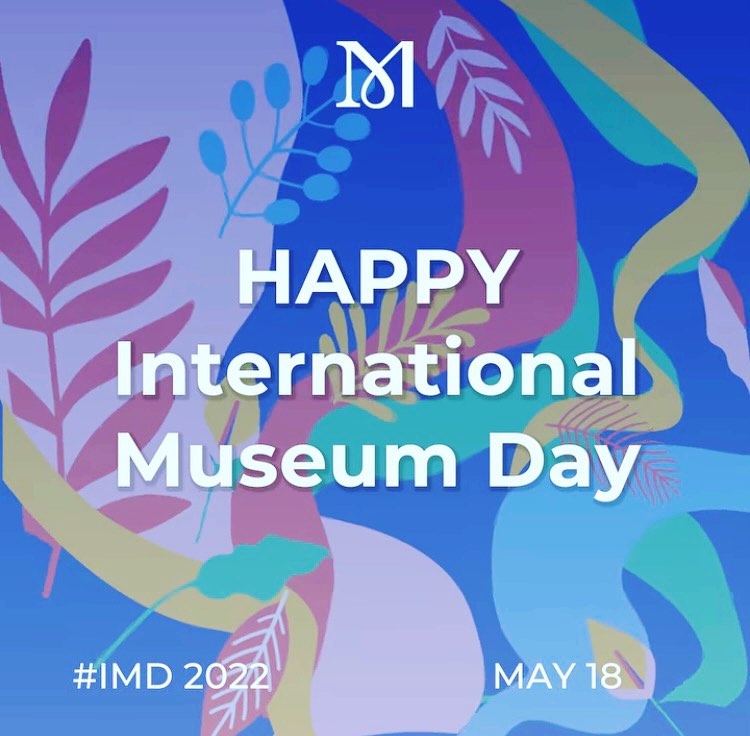
![]() Happy #internationalmuseumday 2022 #icom#thepowerofmuseums
Happy #internationalmuseumday 2022 #icom#thepowerofmuseums
![]() Each year since 1977, ICOM has organised International Museum Day, which represents a unique moment for the international museum community
Each year since 1977, ICOM has organised International Museum Day, which represents a unique moment for the international museum community![]()
The objective of International Museum Day (IMD) is to raise awareness about the fact that, “Museums are an important means of cultural exchange, enrichment of cultures and development of mutual understanding, cooperation and peace among peoples.”
![]()
![]()
![]() Organised on 18 May each year or around this date, the events and activities planned to celebrate International Museum Day can last a day, a weekend or an entire week. IMD was celebrated for the first time 40 years ago. All around the world, more and more museums participate in International Museum Day. Last year, more than 37,000 museums participated in the event in about 158 countries and territories
Organised on 18 May each year or around this date, the events and activities planned to celebrate International Museum Day can last a day, a weekend or an entire week. IMD was celebrated for the first time 40 years ago. All around the world, more and more museums participate in International Museum Day. Last year, more than 37,000 museums participated in the event in about 158 countries and territories
![]() Read more on International Council of Museums – ICOM and https://icom.museum/…/events/international-museum-day/
Read more on International Council of Museums – ICOM and https://icom.museum/…/events/international-museum-day/
![]() ICOM
ICOM
Thanks to the co-chairs of ICOM Define, Lauran and Bruno, for an excellent presentation of the fourth stage of the consultation towards a new museum definition – and the over 75 participants from various countries and committees for good questions and input. Here is the recording for all to watch and share! Remember to vote for the range of the five definition proposals by April the 10th!
Upcoming Meeting Room Event
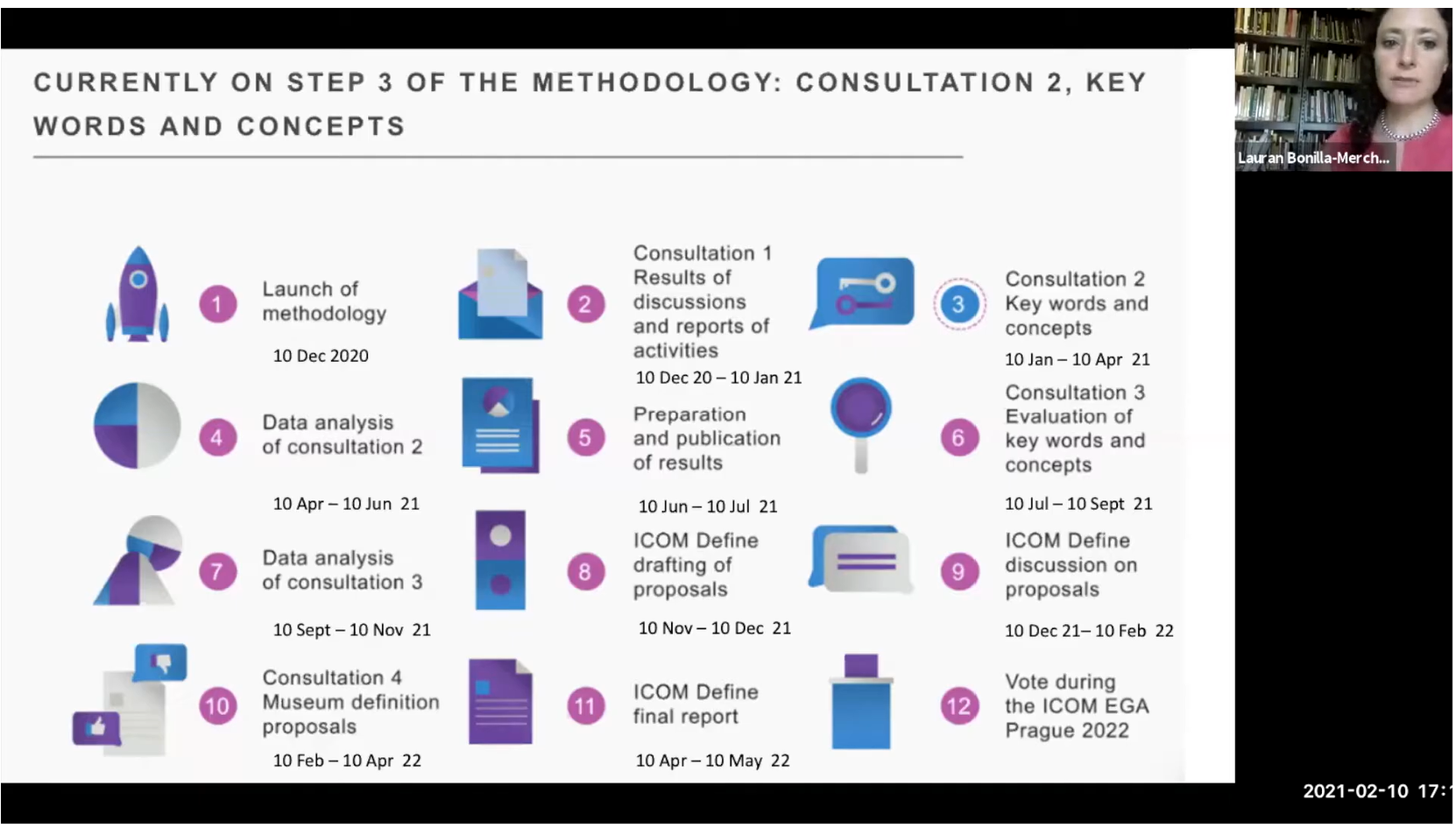
Topic: Meeting Room Event ICOM Define
Time: Mar 14, 2022 at 17:00 (CET)
IC Ethics Meeting Room Event with ICOM Define
IC-Ethics is greatly delighted to host ICOM Define members Lauran Bonilla-Merchav and Bruno Brulon Soares to discuss the concepts and keywords from the analysis conducted in the last years. It will give rise to the third phase of consultations in this globally participatory process to arrive at a new and shared definition of “museum”. We’ll meet on March 14th at 17:00 CET on Zoom, and you all are warmly invited to attend. It’s a great possibility to give voice to our thoughts about our common field of interest. We look forward to seeing you!
Join us with this link: https://us02web.zoom.us/j/82188215719?pwd=MG5ocWlGNWZzU3h4MVUzRzV6cXRYUT09
Call for papers
Today we share a Call for papers, published by the editors Susanna Cordner, Jen Kavanagh, Ellie Miles, Rosamund Lily West.
They write the following: Ethics of contemporary collecting – upcoming book
In early 2020, museums across the world were forced to close their doors due to the COVID-19 pandemic.These closures then coincided with the resurgence of the Black Lives Matter movement, with institutions having to engage with the public in new and remote ways. There have been growing calls both internal and external to the sector to decolonise museum collections, highlighting the need for museums to change their models and approaches to collecting now and in the future.
If you are interested in being considered as a contributor, please submit a proposal and a short biography. Find information in the pfd file.
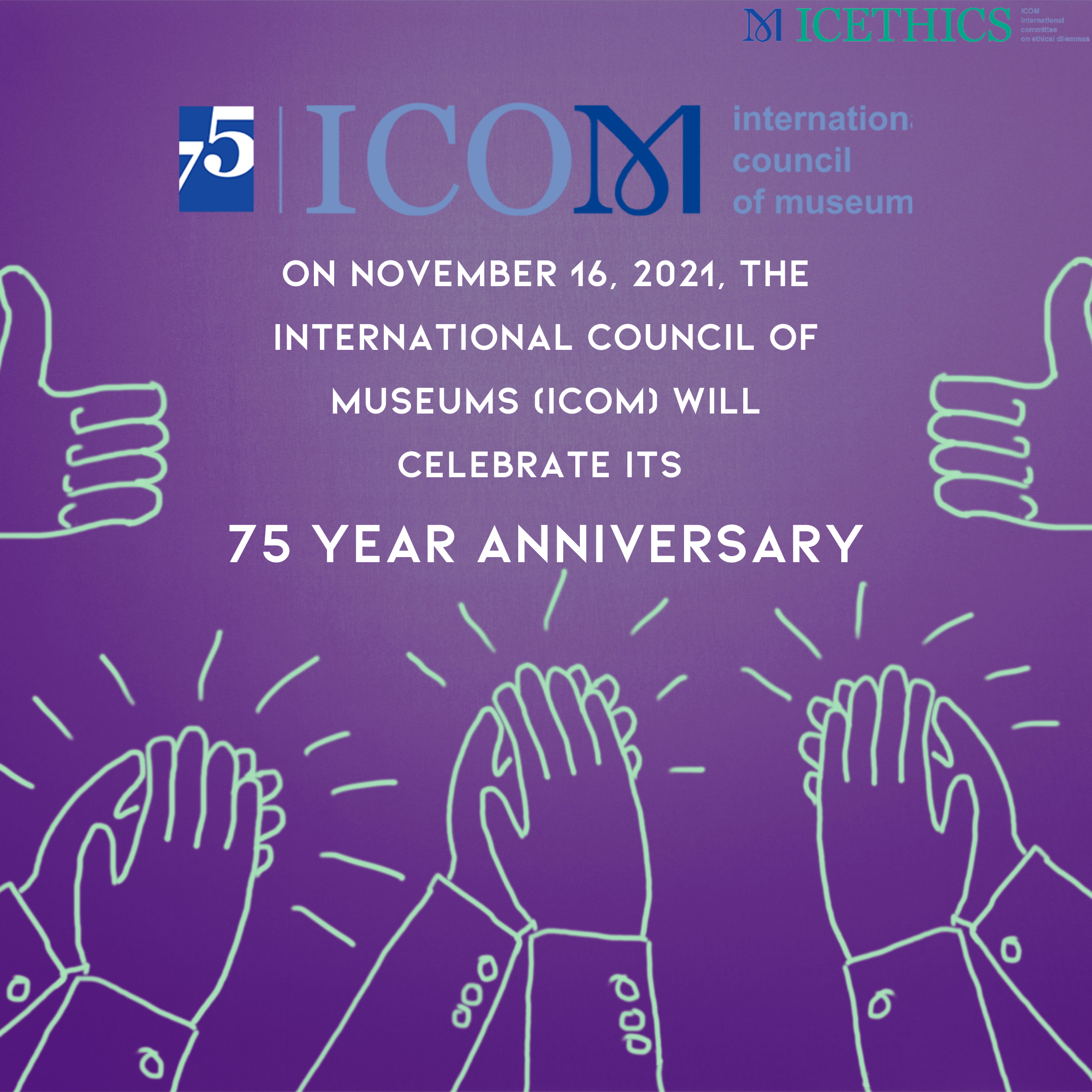
On November 16, 2021, the International Council of Museums (ICOM) will celebrate its 75 Year Anniversary.
This historic milestone comes at a time of both great challenges and opportunities for our organisation. During the past year, despite the difficulties brought on by the Covid-19 pandemic, our international network found a spirit of innovation and creativity that made ICOM as active as ever.
The 75 Anniversary will be a unique occasion to look back at the history of our organisation and move forward together towards our shared future.
Find more information on ICOM’s webpage: https://icom.museum/, among others this:
The heart of ICOM: Peace through cultural exchange
ICOM was founded in 1946, at a time in which calls for pacifism and unity birthed many international organisations with the aim of building a lasting peace in the aftermath of World War II. The conflict was over; but reconciliation was still a long way ahead. Chauncey J. Hamlin, then Chairman of the Board of Trustees of the Buffalo Museum of Science (United States), envisioned an organisation of museums dedicated to fostering international cooperation. ICOM was born on November 16, 1946 at a meeting held at the Louvre Museum in Paris.
“In 1945, when I met Georges Salles, who was then Director of French museums, I suggested to him that we set up an International Council of Museums. He was immediately enthusiastic and agreed to sign a circular inviting the world’s most eminent museologists to an international meeting at the Louvre in November 1946. His backing helped me to secure the support of the Director of the British Museum in London.” – Chauncey J. Hamlin recalling the creation of ICOM.
From the outset, the United Nations Educational, Scientific and Cultural Organisation (UNESCO) offered to host ICOM on the premises of its Paris headquarters in Avenue Kléber and made it one of the first NGOs with which it established formal links. A year later, on November 8 1947, ICOM celebrated its first General Assembly in Mexico City. Like J. Hamlin, the first few members of our organisation were convinced that, if the culture of every nation was more widely known, there would be a broader ground for mutual understanding.
“1. We believe that it is of the greatest importance for every nation that the knowledge of the cultures of the various countries forming part of one world should be made more widely known; 2. By these means there will be a broader ground of mutual understanding, for through exchange of cultural knowledge there is a common ground for peace;” – Resolution No. 4 ICOM 1st General Assembly, Mexico City, November 8, 1947.
Annual meeting
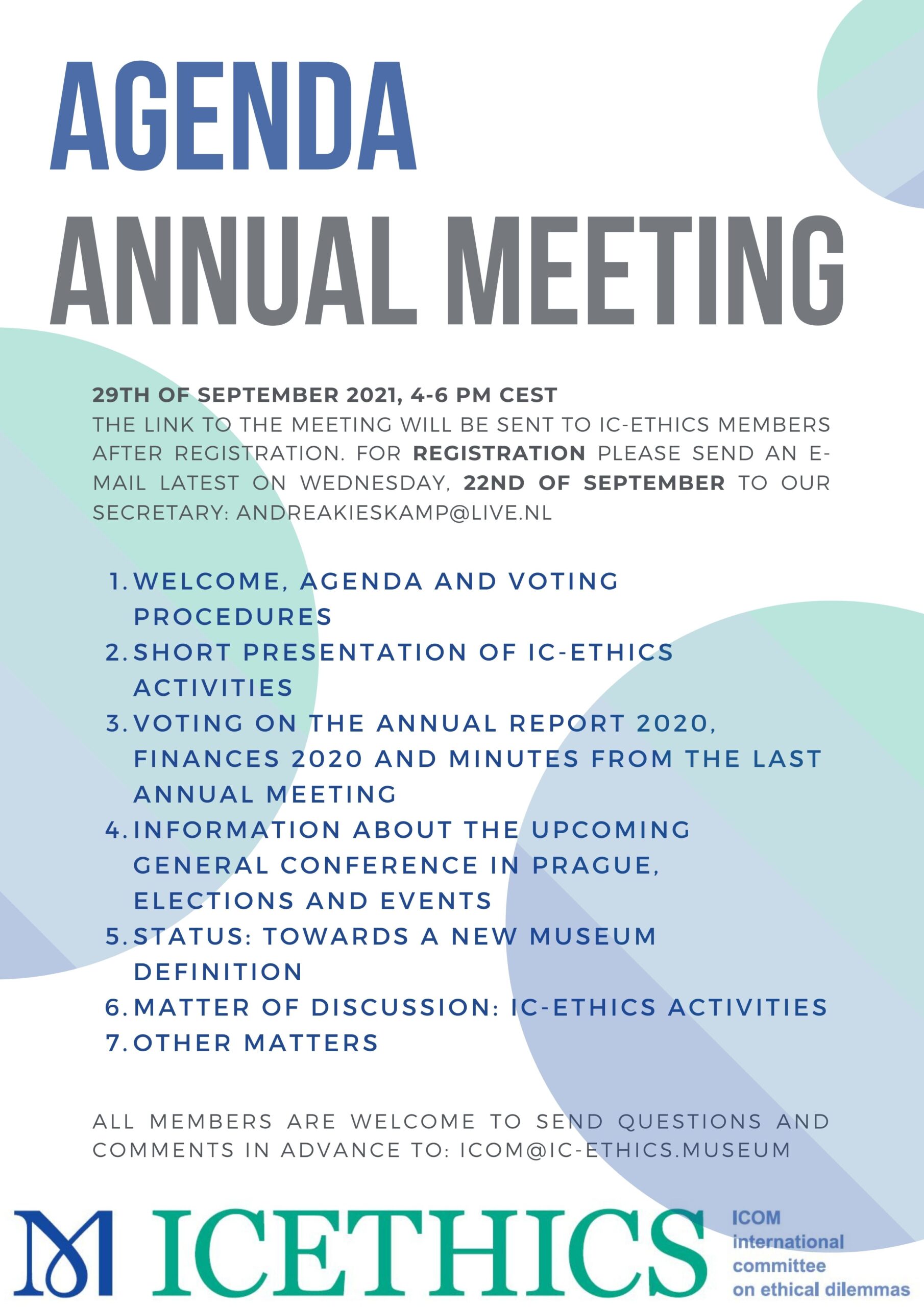
REMINDER! On Wednesday, the 29th of September, IC Ethics will arrange its second Annual meeting, and all IC Ethics members are invited to join! Among others, we will present our ongoing work and plans for the next year, as well as give you an update on the work towards a new museum definition. Also, we will have a presentation of next year’s happenings at ICOMs General Assembly in Prague in August 2022.
Please register for the Annual Meeting here: https://us02web.zoom.us/meeting/register/tZMvd-mgqD0rGtVBw7tRjJq27hgR1vAVp4lT and join us on the 29th!
IC Ethics Meeting Room: Coping with Colonial Heritage: Questions on Ownership, Power and Inclusion
Moderator:
Andrea Kieskamp, board member IC-Ethics
Speakers:
Isabella Ducros, Alma Mater Studiorum University in Bologna, Italy Lina Lozano, Utrecht University, The Netherlands
Coping with Colonial Heritage:
Questions on Ownership, Powerand Inclusion
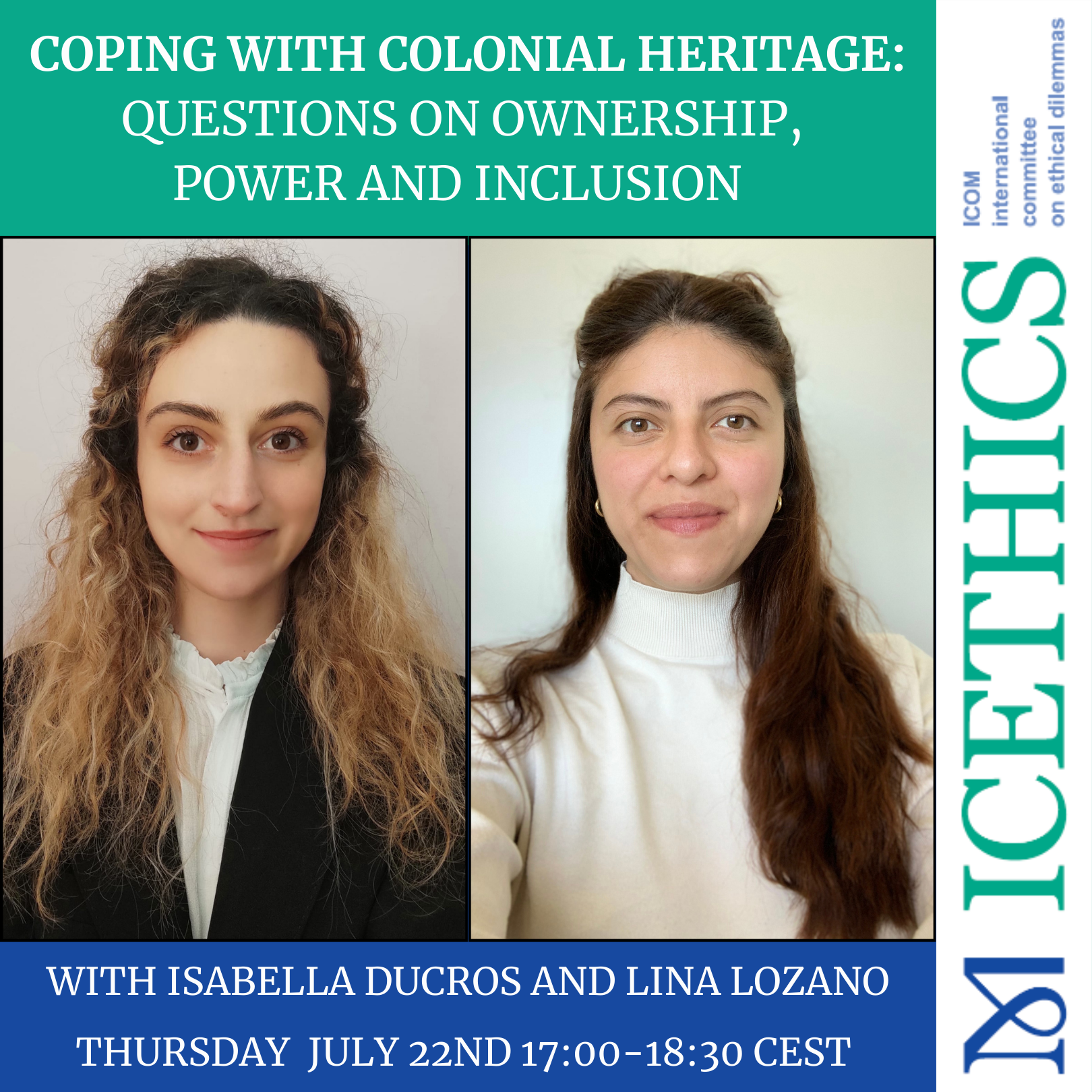
Thursday, July 22nd, 17:00-18:30 CEST
The dilemma of how to cope with colonial collections and return is an urgent topic in many European countries. It raises a whole set of questions regarding ethics. What factors are at stake in the return of colonial heritage? How do governments deal with the topic? What is the role of museology in working with source communities? These and other questions are explored in two European examples.
The case of Italy highlights the return process of the Axum Stele to Ethiopia and a project on working with diaspora communities on the re-signification of objects. The case of the Netherlands where the government initiates a long-standing project to return objects linked to their ex-colonies shows how to deal with such large-scale restitutions. By studying the exchange between Surinam and the Dutch territory we will think about institutional hierarchies and how to put the interests of the communities at the core of the decisions.
Moderator:
Andrea Kieskamp, board member IC-Ethics
Speakers:
Isabella Ducros, Alma Mater Studiorum University in Bologna, Italy Lina Lozano, Utrecht University, The Netherlands
Register in advance for this meeting: https://us02web.zoom.us/meeting/register/tZAucuippjMsHtZ3DRaAHb6N7quyfUfnvPLQ
After registering, you will receive a confirmation email containing information about joining the meeting.
Ethical Challenges when Working with Personal Narratives on Sensitive Topics – 27 May 2021
Moderator: Dr Kathrin Pabst, Chair of IC-Ethics
Panelists: Neringa Latvytė (University of Vilnius, Lithuania)
Urška Purg (National Museum of Contemporary History, Slovenia)
Ivalo Olsvig (The House of Knud Rasmussen, Denmark)
22 participants followed the presentations, and several of them contributed to the conversation after the recording had stopped. The discussion was mainly related to the added demands of working with personal narratives of minorities the museum employee him- or herself is a part of. Also, it was pointed out how personally demanding it is to listen to difficult experiences when one can recognise the feelings expressed. Colleagues one can talk to and get advice from, as well as the support from institutions leader is crucially important to be able to conduct the work properly and avoid burn-outs.
New Meeting Room Event coming up!
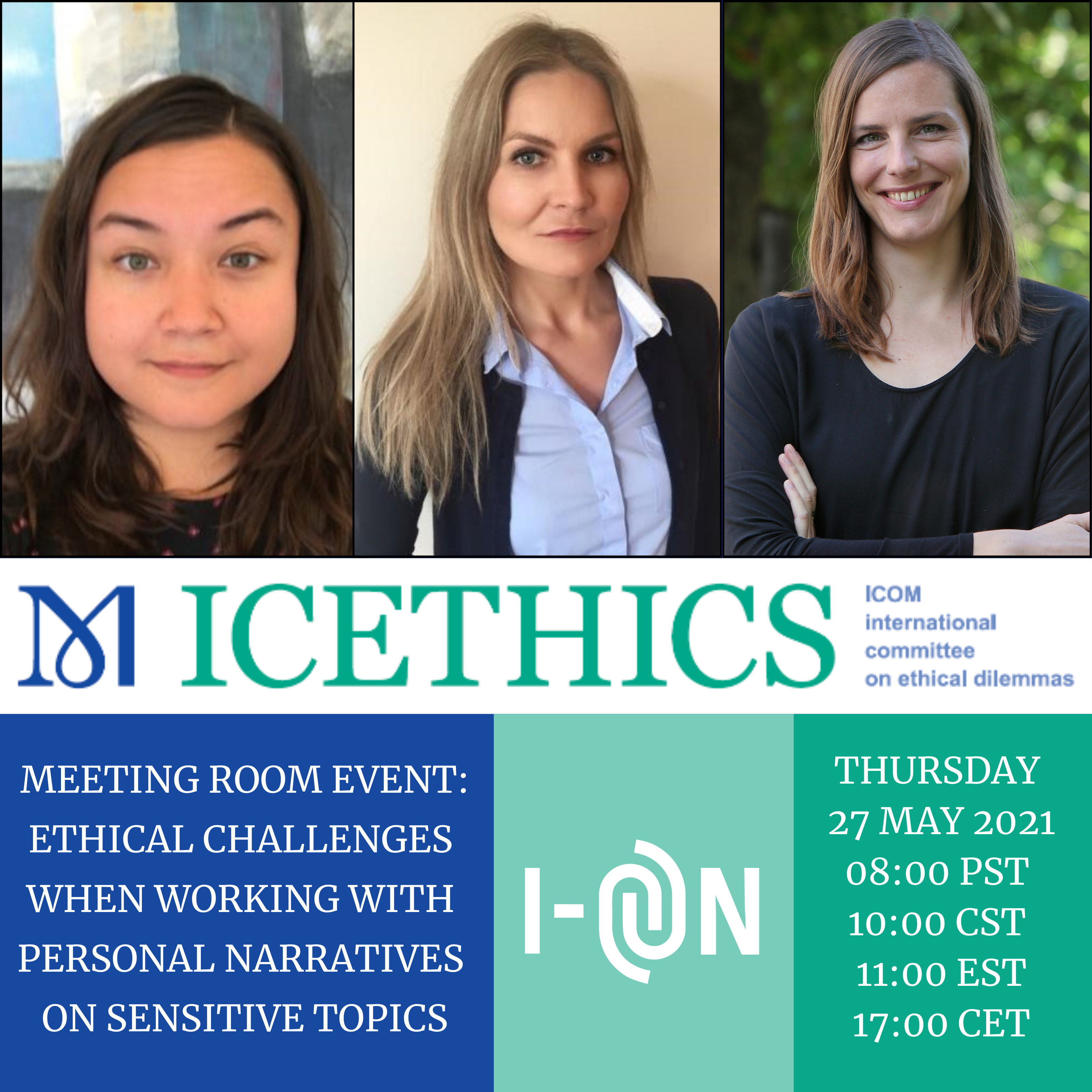
Ethical Challenges when Working with
Personal Narratives on Sensitive Topics
Thursday, 27 May 2021
08:00 PST – 10:00 CST – 11:00 EST- 17:00 CET
Under the surface of our societies, there are thousands and thousands of stories that could add shades and details to a black-and-white picture of historical events. But many of these stories are too private, too personal or too traumatic to share. Feelings of despair, shame, guilt or even trauma might be involved, and one could be afraid of the reactions of others when telling them. Here, museum institutions and museum professionals might function as mediators and connecting links between those who are willing to share and those who need to know. In this process, there are many ethical considerations to take. How to collect personal narratives on sensitive topics from individuals who often want to be anonymous, and how to present them? How to meet the needs of all involved, also the museum professionals themselves?
Moderator: Dr Kathrin Pabst, Chair of IC-Ethics
Panelists: Neringa Latvytė (University of Vilnius, Lithuania), Urška Purg (National Museum of Contemporary History, Slovenia) and Ivalo Olsvig (The House of Knud Rasmussen, Denmark).
Note: All panelists are part of the same international cooperation project, “Identity on the Line”, and will relate in their presentations to this.
Please see www.i-on.museum for more information.
Register in advance for this meeting:
https://us02web.zoom.us/meeting/register/tZIofumtrDgpHdRj0WAmcETmLCj76OLdn4Iu
After registering, you will receive a confirmation email containing information about joining the meeting.
PDF:
Neringa Latvytė
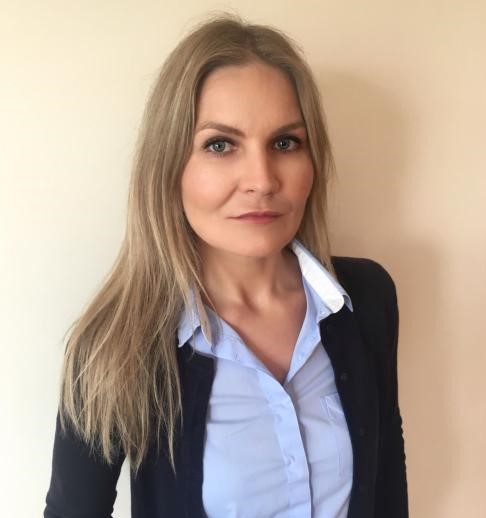
Photo: Giedrė Tylaitė
Neringa Latvyte is a historian by training, researcher and author of a few books on the Holocaust in Lithuania. She is working on her PhD on the communication of the Holocaust memorial sites at the Faculty of Communication, Vilnius University where she is a lecturer of communication of traumatic memory and cultural heritage as well. She has published several articles on the memorialization of traumatic past in Lithuania. Her current research combines practical and theoretical challenges on transmission of traumatic unspoken memories.
Within I-ON, she is a national coordinator for the Lithuanian partner, who deals with the stories of wounded silent past and unspoken memories of women who survived the Second World War. The focus is to analyse the effect of traumatic events of the Holocaust survivors and how their trauma is generational transmitted.
Urška Purg
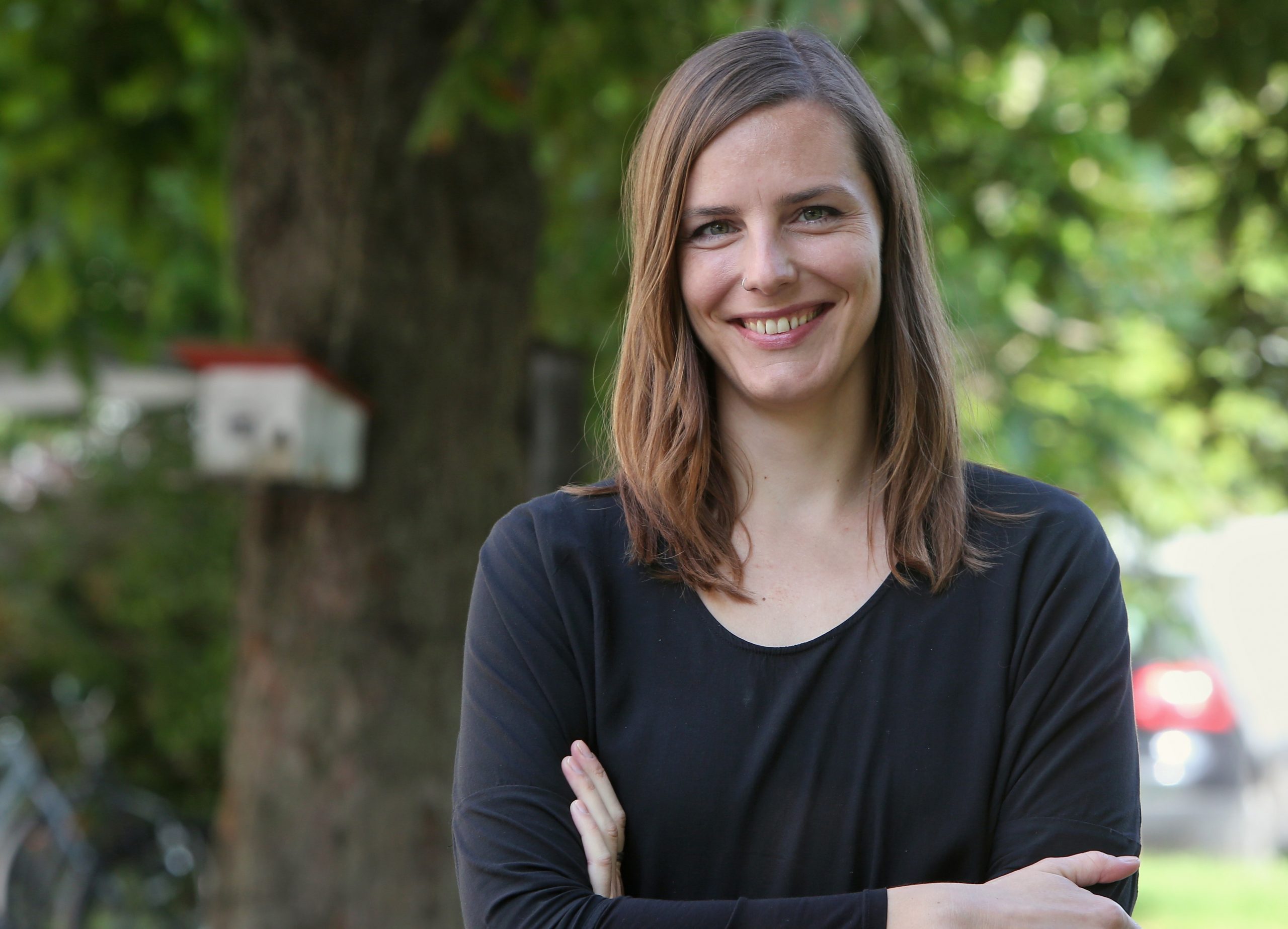
Photo: National Museum for Contemporary History, Slovenia
Urška Purg is an ethnologist and cultural anthropologist and museum counsellor in the National Museum of Contemporary History. Nearly a decade ago, she found herself having a knack for museology in all its forms, and the contextualisation of museums on the national and international level. Since then, she has been passionately working on participatory museology projects tackling the topic of inclusive museums. Having also a degree in social pedagogy contributes a great deal to the challenges she is facing.
Within I-ON, she is a national coordinator for the Slovenian partner, who is focusing on the stories of those who migrated to Slovenia from the federal republics of ex-Yugoslavia after the Second World War, their children and grandchildren and how they perceive their identity. The focus is on inclusively presenting the stories of sense of belonging, reasons for moving and who we are; switching from ‘making the exhibition about’, to ‘making an exhibition with the storytellers’.
Ivalo Katrine Birthe Foget Olsvig
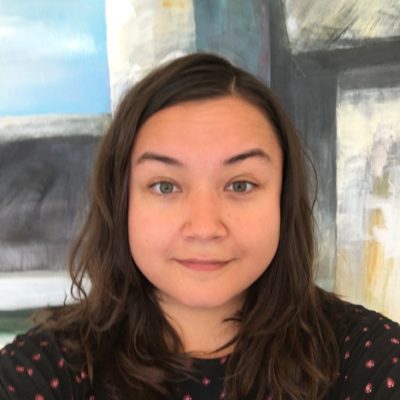
Photo: The House of Knud Rasmussen
Museum Curator at The House of Knud Rasmussen. Ivalo Olsvig holds a Master of Arts (MA) in Greenlandic & Arctic Studies with specialization in Museology from The University of Copenhagen. Ivalo Olsvig is employed on the EU project ‘Identity on the Line’, supported by the EU-program ‘Creative Europe’. She will help to uncover issues of identity, identity creation and migration among Greenlanders living in Denmark and the experiences and encounters that two cultures can cause. Ivalo was previously employed at The National Museum of Denmark, The Brumleby Museum and The Natural History Museum of Denmark. In addition, Ivalo Olsvig is on the support committee in Denmark for The Greenland Christmas Seal, and SoMe-manager for ICOM Ethics.
ONLINE KICK OFF EVENT
Dear IC Ethics members – please provide your input now!
What do YOU think a new Museum Definition should contain –
and is anything missing in ICOMs Code of Ethics?
Until the 11th of April 2021, all National and International Committees as well as Regional Alliances and Affiliated Organisations of ICOM are asked to connect with their members to collect contributions to ICOMs new museum definition & a possible review of the Code of Ethics. Both processes are essential for the ICOM Community, and they will go hand-in-hand.
We hereby invite you to share your thoughts, wishes and insights by
- Filling out the attached document and send it to icom@ic-ethics.museum by 1st of April, or
- Give your input directly by joining us for a Meeting Room Event on
Thursday, 4th of March at 08:00 PST//10:00 CST//11:00 EST//17:00 CET.
Please register here: https://us02web.zoom.us/meeting/register/tZYsdO6sqzwoEtMUwXpqDaKqXMFEIQlB9vY_
Here, you will find more information on
THE MUSEUM DEFINITION:
- ICOM member space: scroll down on your dashboard, click thumbnail ‘Take part in the new definition of the museum!’
- Youtube channel IC Ethics: Towards a new Museum Definition with Lauran Bonilla-Merchav, Co-Chair of ICOM Define:
THE CODE OF ETHICS:
- Youtube channel IC Ethics: Towards a possible review of ICOMs Code of Ethics with Sally Yerkovich, Chair of ETHCOM:
Publics marginalisés et institutions culturelles : présence, influence et participation
Friday, 26th of March 2021
09 PST – 11 CST – 12 EST – 18 CET
Cette séance du Comité de dilemmes éthiques de l’ICOM s’interroge sur les questions récurrentes, mais fondamentales suivantes : comment favoriser la présence de publics issus de communautés socialement et culturellement marginalisées dans les musées et les institutions culturelles ? Comment assurer leur présence dans les lieux ? Comment favoriser cette dernière de façon éthique – en abordant notamment les enjeux de leur représentation et pouvoir d’influence ? À quelles conditions les liens créés se renforcent-ils avec des initiatives participatives ? Quels en sont les enjeux ?
Ces questions seront abordées dans une réflexion transversale issue du partage de bilans de trois projets riches expérimentés au Québec :
(1) la recherche-action de laquelle est tirée Médiation culturelle, musées, publics diversifiés. Guide pour une expérience inclusive (Écomusée du fier monde, Ève Lamoureux, Francine Saillant, Noémie Maignien et Fanny H-Levy);
(2) l’exposition Témoigner pour agir (Marie Nengeh Mensah, Jamie Wilson Goodyear et 3 groupes communautaires partenaires : COCQ-SIDA, GRIS-Montréal, Stella, l’amie de Maimie);
(3) l’application mobile RAMY [Regarde à travers mes yeux] (Start-up montréalaise Cilia en collaboration avec une équipe mise sur pieds par PRISME, le laboratoire d’innovation en médiation numérique du Musée des beaux-arts de Montréal).
Inscription nécessaire: https://us02web.zoom.us/meeting/register/tZcpdu-vrDouGNRFEnL-Ig2AIXQmMj6Rb1RT
Animation

Ève Lamoureux est professeure au département d’histoire de l’art de l’Université du Québec à Montréal (UQAM). Ses recherches portent sur une réflexion art et politique, notamment sur l’art engagé, les arts communautaires et la médiation culturelle. Elle est membre du Centre de recherche Cultures – Arts – Sociétés (CELAT) et de l’Observatoire des médiations culturelles (OMEC).
Personnes conférencières

Laura Delfino est doctorante au département d’histoire de l’art et d’études cinématographiques de l’Université de Montréal. Encadrée par la Chaire de recherche du Canada en muséologie citoyenne, sa recherche porte sur le rôle de l’institution muséale dans la construction du sentiment d’appartenance. Elle collabore actuellement avec PRISME, le laboratoire d’innovation en médiation numérique du Musée des beaux-arts de Montréal.

Éric Giroux est directeur de l’Écomusée du fier monde, à Montréal, depuis avril 2020 et responsable de la recherche et des collections. Il est détenteur d’un baccalauréat en science politique et d’une maîtrise en histoire. Impliqué au sein de cette institution depuis plus de 20 ans, il a participé à plusieurs projets de recherches universitaires et a réalisé de nombreuses expositions.

Jamie Wilson Goodyear est artiste, professeur au Collège John Abbott en arts visuels et candidat au doctorat en Études et pratiques des arts à l’UQAM. Sa recherche-intervention doctorale s’ancre dans le co-commissariat de l’exposition Témoigner pour Agir. Jamie combine une réflexion critique sur les témoignages artistiques, la queerté et la vie avec le VIH en tant que commissaire et en tant que créateur dans les marges entre l’artisanat et l’art.

Noémie Maignien est candidate au doctorat en Muséologie, Médiation, Patrimoine à l’Université du Québec à Montréal et membre du CELAT et de l’OMEC. Elle a travaillé dans les milieux culturels et communautaires à Montréal. Ses recherches portent sur les publics de la culture et les institutions culturelles à travers le prisme de l’accès à la culture.

Maria Nengeh Mensah est professeure titulaire et directrice à l’École de travail social de l’UQAM. Chercheure féministe engagée socialement, elle mène des projets de recherche-action réunissant les milieux associatifs et académiques autour des défis liés à la stigmatisation et à l’inclusion sociale de communautés sexuelles et de genres diverses. Elle dirige le groupe de recherche Cultures du témoignage.
Towards a review of ICOMs Code of Ethics
Thursday, 11 February 2021
08:00 PST – 10:00 CST – 11:00 EST- 17:00 CET
Welcome to an informative event about ICOMs Code of Ethics and its upcoming review!
Parallel with the process towards a new museum definition, ICOM has asked its Standing Committee for Ethics (ETHCOM) to oversee a review of the ICOM Code of Ethics for Museums. All ICOM members are invited to identify what is missing from the current Code of Ethics, and what is needed to make it an even more powerful tool for today’s museum profession. This survey of the membership will help ICOM determine whether a revision of the Code is necessary at this time.
Join us for an informative Meeting Room Event with Sally Yerkovich, Chair of ETHCOM, and get first-hand information about the process ahead – and how you personally can contribute to it.
Check out ICOMs member space for more information: https://icom.museum/en/news/icom-define-consultation-2-what-should-be-part-of-the-new-museum-definition/
Towards a new Museum Definition
Wednesday, 10 February 2021
08:00 PST – 10:00 CST – 11:00 EST- 17:00 CET
Welcome to a Kick Off Event for input for a new museum definition!
On Thursday, 10th of December, ICOM presented a new way forward towards a new museum definition. Under the lead of Lauran Bonilla-Merchav and Bruno Brulon, ICOM Define is working with an inclusive approach, transparent methodology and openness all steps of the way towards a new definition of a museum. The process is aiming to arrive at the next ICOM General Conference in 2022 with a museum definition proposal to be submitted for a vote. In advance, four rounds of consultation with all members will be conducted.
IC Ethics hereby invites all our members to a Kick Off Event with Lauran Bonilla-Merchav. Here, you will be provided with all input needed to know to make your voice be heard while discussing this crucial topic.
Save the date and check out ICOMs member space for more information about the process and all relevant documents:
https://icom.museum/en/member/take-part-in-the-new-definition-of-the-museum/
Dominant political power influencing museums’ programs
January 2021
Since many museums are often symbols of status, power and prestige of nations and regions, it is not uncommon that state or local politics endeavour to influence their programs. Even more so, some museums might be perceived as instruments of dominant political power. In some cases, especially those where museums serve patriotic educational purposes, nationalistic messages might be spread through their activities. That arouses many ethnical questions concerning muted voices, disregarded themes or ideologically appropriated interpretations.
Moderator: Dr. Lidija Nikočević, Board Member of IC Ethics
Introduction: tba
16 November 2020: Intangible Culture and its Interpretation in Museums
Intangible cultural heritage (ICH) is regarded as heritage but at the same time as living traditions. That means that many communities, the holders of these traditions, are experiencing them as a vital part of their identity – sometimes even as something intimate – that serves to strengthen the ties within the community. When interpreted and made public within museums’ programs, another dimension and way of communicating of a living tradition occurs, together with ethical dilemmas about the holders’ privacy, respect for their criteria regarding choices and evaluation and many other issues that might negatively influence the interaction between museums and communities.
Moderator: Dr. Lidija Nikočević, Board Member of IC Ethics
Panelists: Dr Marc Jacobs (Belgium), Leena Marsio (Finland), Jorijn
Neyrinck (Belgium), Tamara Nikolić Đerić (Croatia), Joanne Orr (UK)
(A short summary of the discussion will follow soon.)
8 October 2020: Ethical Challenges when Working on the Return of Heritage from Colonial Collections
Moderator: Andrea Kieskamp, Board Member of IC Ethics
Introduction: Dr. Jos van Beurden, affiliated senior researcher colonial collections and restitution issues at the Free University, Amsterdam (Netherlands)
Presentations of recent ethical dilemmas: Dr. Aimé Kantoussan, Director of Research of the Museum of Black Civilisations, Dakar (Senegal); Dr. Adriana Muñoz, Latin American curator at the National Museums of World Culture Sweden (Sweden) and Roselyne Francken MA, curator and keeper of the Asia collection at the MAS, Antwerp (Belgium)
Colonial heritage and the discussion on return is a highly sensitive issue. In recent years, the topic has moved up the agenda in European countries with a colonial past. The calls for justice from former colonies are becoming louder and louder. The discussion of this Meeting Room started by questioning paragraph 6.2 in the Code of Ethics for Museums (2004): “Museums should be prepared to initiate dialogue for the return of cultural property to a country or people of origin”. Are we not beyond the point of “prepared” sixteen years later? Shouldn’t museums be asked for a more pro-active attitude? What dilemmas – on both sides – complicate a return process? Does the diaspora have a role?
In his introduction, Jos van Beurden formulated three benchmarks for dealing with claims and urges for return: trust, equality and justice. The participants supported the basic principle but stressed that they need to be further elaborated. Various complexities were then discussed.
Important dilemmas were raised, among others related to questions to whom and how to return the objects. To a source community or to a national government? And who decides about the priorities in provenance research? The ideal situation was described as a process in which all parties work together right from the start, and one participant stated that the process of joint provenance research was even more important than the actual return of objects. This is especially important when museums have no proper documentation about objects from former colonies. Again, mutual exchange of knowledge between museums and local communities is essential here, as museums have to approach knowledge in another and new way and to take into account intangible heritage connected to the objects.
25 August 2020: Who gets to decide in the end? Sponsors and museum professionalism
Moderator: Dr. Kathrin Pabst, Chair of IC Ethics
Introduction: Prof. Dr. Sally Yerkovich, Chair of ETHCOM
Museums often depend on the cooperation with private sponsors when in need of more money to fulfill working tasks in the way they wish to. In many countries, financially strong companies are willing to help with generous financial contributions, and private investors may give or lend parts of their collections. However, major ethical challenges can arise, when this transfer of resources is linked to certain demands on how the museum has to use the money or objects. This can jeopardize the high level of professional and institutional integrity as well as autonomy of museums as stated in Principle 1.10 of ICOM Code of Ethics. Challenges can also arise when a sponsor’s reputation is called into question. Is there anything a museum can do to protect itself from this kind of controversy?
Twenty-two participants, mainly from the U.S. and Europe, joined this IC Ethics Meeting Room to discuss ethical dilemmas related to sponsors and museum professionals. Among the issues discussed, after the introduction by Sally Yerkovich, was the question to which degree a focus should be placed on the way sponsors earn their money. Also, it was pointed out that there are several levels of frameworks which are important when working together with sponsors, as for example national laws, professional codes of ethics or institutional codes of ethics. Institutional fundraising policies, based on all important laws and frameworks, were mentioned as extremely important, and they have to be known among all employees of the museums, the communities and potential sponsors. As a cooperation with sponsors will most likely increase in the future, the wish for sharing good contracts among museum institutions and professionals was expressed. IC Ethics will share examples when sent to them. ETHCOM is aiming to publish guidelines on fundraising policies by the end of this year, and also share examples of contracts on the ICOM membership space.
29 July 2020: The Ethics of Diversity, Equity, Accessibility and Inclusion (DEAI) Work in the Museum Sector (Special Meeting Room/Webinar)
Moderator: Armando Perla, Board Member of IC Ethics
Panelists: Thiané Diop (Canada), Patty Arteaga (USA), Michael Jacobs (South Africa), Craig Middleton (Australia), Megan Sue-Chue-Lam (Canada), Julián Zapata Rincón (Colombia)
What does it mean to do DEAI work in Museums? What are some of the ethical challenges and consequences faced by institutions that overlook DEAI work? How do these challenges affect museum professionals working in these areas?
In this special event organized and hosted by IC Ethics, participants had the opportunity to hear and engage with museum professionals who utilize different strategies to advance DEAI work in their institutions. They also shared practical examples of how they have helped those institutions address some of those ethical challenges arising from overlooking this necessary work.
IC Ethics hosted a special meeting room to learn how museum professionals from around the world are working to redress the unequal distribution of power and foster the meaningful participation of historically excluded communities in museum institutions. Panelists discussed their own experiences working in this area, the absence of ethical guidelines for museum professionals working with vulnerable groups, different ethical dilemmas they have faced and strategies they have developed to overcome them. Topics ranged from Black, Indigenous and People of Colour led mobilization campaigns against racism in museums and university museum studies programs in North America to collaborative work with queer youth in Australia. From a national museum in the United States collecting and preserving the material culture of mobilizations led by undocumented migrants to curatorial work engaging the sex worker, trans and BDSM communities in the way an art museum in Colombia is opening its doors to become more attuned to the needs of its neighbours.
1 June 2020: Illicit Trafficking of Cultural Property
Moderator: Dr. Lina G. Tahan, Board Member of IC Ethics
Introduction: Dr. Christos Tsirogiannis, Aarhus Institute of Advanced Studies
Illicit Trafficking of Cultural Property addresses many serious ethical dilemmas that all museum professionals can face when acquiring artefacts to enrich their collections. Questioning the provenance of the object before acquiring it and doing the due diligence are two important issues to consider in the profession. In the past few years, the trade in illegal artefacts coming from war-torn countries became so serious that ICOM, Interpol and UNESCO became the main actors that played a role in fighting this reprehensible phenomenon. We will be introducing the topic and discuss the scourge of this trade.
Twenty-eight participants from different parts of the world joined our IC Ethics Meeting Room to discuss this problem and the ethical dilemmas that they face as museum professionals. Among the points discussed were the need to look at archives and examine the provenance of how the artefacts entered the museum collection and the need to report to the authorities all wrongdoing, talk to the press and to the experts. This was pointed out as our due diligence for working in line with the ICOM Code of Ethics. Other ethical challenges discussed were related to the lack of academic ethics when publishing an artefact in scientific journals or books knowing that they are stolen objects. Several legal tools and instruments that museum professionals should use when they face this ethical dilemma in their line of work, were mentioned, as well as the need to work actively to ensure that countries sign the UNESCO Convention of 1970, the UNIDROIT Convention of 1995, etc. Last but not least questions regarding repatriation came up, and the fact that there are not enough ethical guidelines about these cases yet.
18 May 2020: Ethical dilemmas related when working for Equality: Diversity and Inclusion
Moderator: Dr. Valeria Pica, Board Member of IC Ethics
Introduction: Cristina Da Milano, Board Member of Culture Action Europe
Equality in museum professions has been deeply affected during the lockdown due to the pandemic and many museum professionals – especially educators and free lancers – are experiencing difficult times. Probably, many of them won’t get back to their job position and this prospect makes many questions rise about possible disparities in cultural institutions activities in the months to come.
IC Ethics celebrated the International Museum Day 2020 by giving voice to museum professionals who are experiencing unequal working conditions due to the pandemic lockdown all around the world, oriented towards educators and freelancers. Their jobs have been on the line because of how they have been furloughed, and they are the one group who have suffered the most because of the sudden closure of museums. Cristina Da Milano focused in her introduction on working conditions such as social protection, lack of visibility, and sustainability, on the importance of human capital and the recognition of the social value of education in museum institutions. Ethical dilemmas discussed afterwards were related to the professional skills that will be lost after the pandemic’s end if many free lancers and educators won’t get back to their job positions, and to the narratives museums will draft about this period.
23 April 2020: Launch of the IC Ethics Meeting Room
Moderator: Dr. Kathrin Pabst, Chair of IC Ethics
The very first IC Ethics Meeting Room has taken place on Thursday the 23 rd of April 2020, with more than 50 participants from approximately 20 different countries, including Germany, Denmark, Norway, Sweden, Netherlands, Cyprus, France, Great Britain, Scotland, Italy, Albania, Slovenia, Portugal, Canada, Japan, Guatemala, India and Australia!
Thanks to all the 50 participants who made this first meeting a fruitful, productive and encouraging experience for IC Ethics!
The meeting aimed to test the platform and to collect topics of common interest and to examine which ethical dilemmas ICOM members regard as the most relevant and urgent. Among others, these topics have been mentioned:
- Illicit trafficking of artefacts,
- Restitution and repatriation of colonial or holy artefacts,
- Political interference in professional reviews,
- Working in conflict zones,
- The museums´ and the museum professionals´ role as active contributors in situations of crisis (e.g. poverty, refugees),
- Relations between public actors and museum professionals, including sponsorship,
- COVID-19 and its impact on museums as public spaces and working places,
- Diversity, equality, inclusion in museums, among the staff and with communities/the public,
- Exhibitions and the use of language as political statements,
- Openness and transparency in museum organisations.
